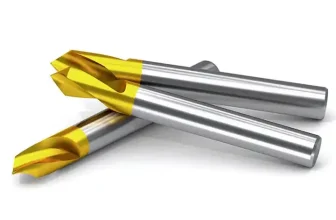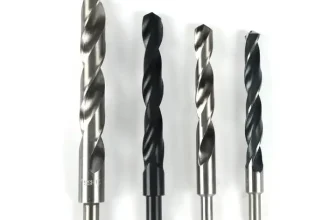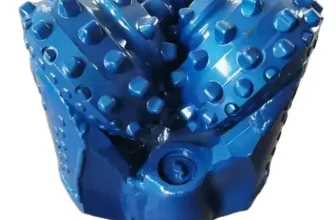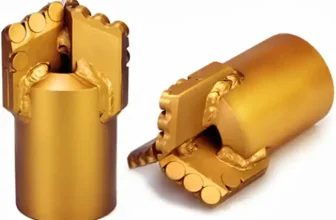When selecting the best tile drill bit the first thing to consider is the type of tile you plan to drill.
There are many different types of tile materials, but when people are talking about drilling tile they are usually talking about either ceramic or porcelain tile.
Tile is Hard
Since tile can be brittle many people think that it is easy to drill.
This could not be further from the truth.
Although it is true that tile is brittle, it is also very hard.
It is because of this hardness that it is actually very difficult to drill.
Drill bits must be made of a harder material than the material they are cutting to work properly.
If you use a bit made of a softer a material than the material you a drilling then the bit will not cut the material you are drilling, and it will actually be cut by the material.
This will quickly dull the bit and make it useless to cut any material.
The Mohs Scale
There is a standard scale of hardness we can use to compare the hardness of different materials.
This scale is called the Mohs scale of mineral hardness and was invented in 1822 by a German geologist and mineralogist named Friedrich Mohs.
The Mohs scale hardness rating goes from 1 (the softest) to 10 (the hardest).
You will find the mineral talc at the hardness rating of 1 since it is very soft.
On the other end of the Mohs scale you will find diamond with a hardness rating of 10.
Diamond is the hardest naturally occurring material on Earth.
One thing to keep in mind about the Mohs scale is that it is not linear.
For example, quartz comes in at a Mohs score of 7, but even though diamond is a 10, diamond is 15 times harder than quartz.
Ceramic Tile
This is probably the most common type of tile you will run into.
Ceramic tile is very durable, so that is why you see it in a lot of places where that is important.
It is also very resistant to stains.
So, we talked about the Mohs just a minute ago, and ceramic comes in around 7-8 on the Mohs scale depending on the type of ceramic.
In contrast, carbon steel only has a Mohs hardness of around 5.5 or so.
The bottom line is that ceramic is harder than steel, and normal drill bits will not be able to drill ceramic tile.
You will need drill bits with tips made of at least carbide to be able to effectively drill holes in ceramic tile.
Most of the bits you probably already have in your toolbox hand normal steel tips, and these are not hard enough to drill through ceramic tile.
It is important to use the best drill bits for ceramic tile when you need to drill holes in ceramic tile to make your job go as smoothly as possible.
Porcelain Tile
If you thought ceramic tile was hard to drill, then porcelain is a little harder still.
While some people seem to get by using carbide tipped drill bits to drill porcelain, we recommend using diamond tipped drill bits when drilling through porcelain.
Check out our guide to drilling porcelain tile and also the best drill bits for porcelain tile.
Carbide vs Diamond Tips
Carbide and diamond are materials that meet the hardness requirements needed to drill ceramic tile.
We normally recommend choosing a diamond tipped bit for ceramic tile since diamond is harder than carbide.
Diamond drill bits are normally not much more expensive than carbide tipped ones, so the price premium should be small.
There are still some advantages of carbide tipped bits, so let’s take a look at some of the main differences between carbide and diamond tips.
Carbide Tip Advantages
One of the advantages of carbide tipped drill bits is that they can be sharpened, where diamond tipped drill bit can not be sharpened.
Carbide tipped bits are limited in the number of times they can be sharpened though.
Since the carbide is only on the tip, once you grind off all of the carbide you can not longer sharpen the bit and will need to replace it with another one.
Carbide tips are often less expensive than diamond tipped bits, so that can be an advantage for them over diamond if that is a main consideration for you.
Carbide Tip Disadvantages
One of the disadvantages of carbide is it is not as hard as diamond, so it will dull faster than diamond.
Carbide tipped drill bits also generate more heat and must be cooled with a liquid coolant when drilling.
Some types of liquid coolants create a sludge and is messy and needs to be cleaned up.
Diamond Tip Advantages
Diamond is the hardest known natural material, so it makes sense it would be used for drilling materials that are harder than steel bits can handle.
The main advantage of diamond tipped drill bits is this hardness.
This allows diamond bits to last longer and also cut faster than other, less durable materials.
Diamond tips also dissipate heat really well, so they can be used without using a liquid coolant and still not overheat.
Diamond tipped bits also cut more precise and smoother holes than other types of bits since they tend to sand as they cut.
Diamond Tip Disadvantages
There are not many disadvantages to diamond tipped drill bits, but there are a couple of minor ones we can mention.
A disadvantage of diamond tips is their cost, as they are normally more expensive than bits with material of other types.
The other disadvantage we can mention is the fact that diamond tipped drill bits can not be sharpened, but this is pretty much offset by their superior durability and toughness.
Conclusion
Drilling into tile is likely more complicated than you might think as first.
This is something you may have found out that hard way if you tried to use the normal drill bits you normally use to drill holes in wood, aluminum, or regular steel.
A combination of the best drill bit for tile and some special precautions will make sure that your tile drilling project goes smoothly.







